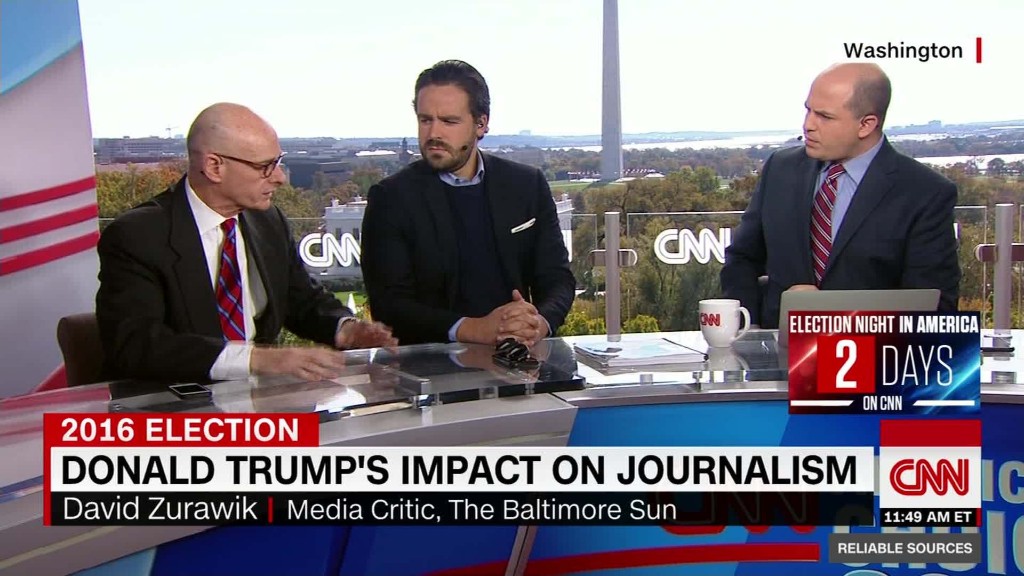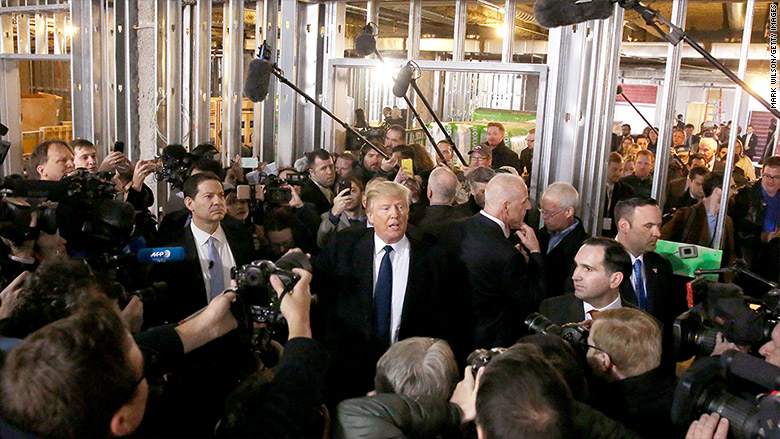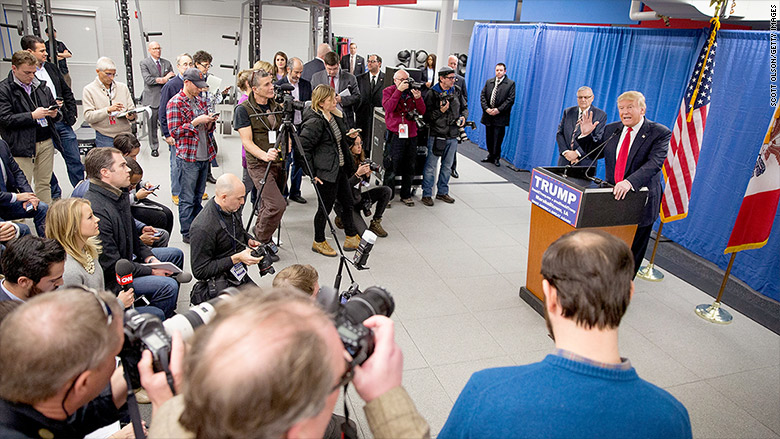
The defining image of the Trump campaign is the Trump rally: unpredictable, raucous, filled to capacity. A band of mostly young reporters traveled from town to town with Trump, some of them for over a year, witnessing history and hyperbole and sometimes hateful behavior by the candidate's supporters.
CNN sought to survey the reporters who spent the most time on the trail with Trump. We granted anonymity to gain the most candid responses possible.
Fifteen reporters from a variety of TV, digital and print outlets participated. Here is what they said, beginning with what they learned:
— "Biggest lesson for me was to keep an open mind about what can happen in politics."
— "That all previous rules of American politics don't apply and that all the mores and cultural norms that guided us in the past are no more."
— "I learned that our country is bigger than I thought and there are many more perspectives than I thought. I saw firsthand parts of our country and communities in our country that I think many of us have overlooked."
Related: Trump voters could be the wild card for exit polls
— "I've encountered so much hate throughout this campaign that I didn't think existed anymore."
— "I learned to trust my instincts. To be fair but to call out inconsistencies when I see or hear them — which is near constant out here with Trump and his campaign."
Trump's pattern of fibs and falsehoods came up again and again in the survey. Said one reporter: "Some weeks out here feel like a segment of 'Weekend Update's' old segment 'Really with Seth and Amy,' where you hear something and you're like 'Really?!'"
Trump wasn't the only person guilty of misstatements. When speaking with campaign aides, "you were lied to more often than you could count," another reporter said. "And especially when the campaign was divided — Corey Lewandowski v. Paul Manafort -- you had to have sources on both sides of the campaign to figure out what was true."
Back to the lessons learned:
— "It showed politics were much messier than I thought," much more complex than "left" and "right."
— "How displaced and fearful some people in the U.S. are about the future. We call it economic anxiety or racial grievance in New York and DC, and that might be correct; but on the ground, in the parts of America that feel the most forgotten, it's a visceral anxiety without a name. And when people are afraid, they can lash out en masse at the things they resent, even if it ultimately cuts against their own interests."
— "I learned how very young reporters carry their university liberalism with them everywhere, and it taints not just what they write but what questions they won't let go of, and their (in)ability to relate to ordinary people in flyover states who are over 30 years old."
— "One lesson: Get out of the prediction business. Reflect what is happening and provide context. Don't try to guess what is going to happen next or what the long term implications are of any single event."
— "To stick up for myself."

Trump's vicious and constant anti-media campaign created concern about the safety of the traveling press corps and the other reporters who were penned in at rallies.
About half of the respondents to this survey said they never felt like they personally were in harm's way. "It's like being a visiting team. They boo, they yell. They don't throw stuff," one of the men explained.
"I never was afraid," one of the women said, "but there were times I sensed that this tinderbox was coming close to igniting."
The other half of respondents said they DID feel threatened. And a couple reporters were, in fact, struck by objects thrown by rallygoers or anti-Trump protesters. "I did feel like I was in danger several times," one man said, "and I didn't quite understand why more wasn't being done to create an environment that made it easier for us to just do our jobs."
One woman said that only in the past month did she start to fear that a reporter would get hurt. "Frankly, I'm surprised no one has been punched," she said.
"We've all built a tolerance to it," another woman remarked, summing up the feelings of several respondents.
On Monday night, there were loud chants of "CNN sucks" from thousands of rallygoers in Scranton, Pennsylvania. Some members of the Trump press corps tweeted their surprise at just how vociferous it was. (For this survey, I opted not to interview any CNN colleagues.)

Most of the reporters who participated declined to say whether covering Trump made them more or less likely to vote for him.
Related: 'Lost' dog brings Trump, Clinton supporters together in new ad
One of them said, "This process as a whole has made me less likely to vote in the election if I wasn't a journalist. That said, seeing the sacrifices so many Americans make -- particularly veterans -- is moving."
Another reporter said the experience "made me more likely to vote. It feels more obligatory when you've followed the election so closely."
Others said they never vote in elections they cover.
So are they sad to see the campaign end?
"Trump is the most unpleasant thing I've ever covered," one veteran reporter griped. Most of the time, candidates who are publicly hostile to journalists are privately friendly or at least accommodating, like Ted Cruz, he said. But Trump was — for better or worse, in this case, worse — consistent: "You couldn't get basic information like 'What city are we sleeping in tonight?' Or, when Trump would say things that were demonstrably false or confusing, there was no one to clear up what he said."
On the other hand, several of the reporters said they would cover a Trump campaign again in a heartbeat.
"It's an amazing story!" said one of the optimists.
Related: From Billy Bush to Howard Stern, unlikely media figures in 2016 election
"I would love to cover another Trump campaign," another optimist said. "It's been frustrating in some ways because we watched the candidate learn on the job, but he brought a sense of imperfect humanity to the process, which we normally don't see. By the time these characters run for president, they've usually sanded all the rough edges off and become creatures of makeup and caution."
Another asked, cheekily, "Can I take a vacation and a nap before I answer?"
One of the other reporters joked (or at least I think he was joking) that he wants to switch to the media beat and cover the mythical "Trump TV" business if Trump loses.
"Trump broke every traditional rule," said one of the reporters who's sad to see it end. "And as much as that was frustrating, I wouldn't have changed it. It was the story of the decade. Win or lose. And I saw it all."


